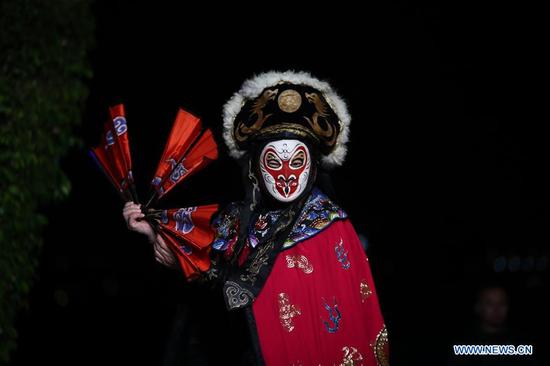 |
An actor performs during the Afro-Chinese Arts and Folklore Festival in Cairo, Egypt, October 27, 2018. [Photo/Xinhua] |
At the unique historical Manasterly Palace overlooking the Nile River in the Egyptian capital Cairo on Saturday, the entrances, gateways and gardens were being decorated with Chinese red lanterns surrounded by colorful lights, where the third edition of the Afro-Chinese Arts and Folklore Festival kicked off with crowds of visitors, including Egyptian celebrities.
The week-long event, which features folklore performances from 25 countries including China, Egypt, Algeria, Morocco, Iraq, South Africa, Nigeria and Botswana, holds two stages, one for Arab and African performances and the other for Chinese ones.
In his address at the opening ceremony, Egyptian Minister of Culture Inas Abdel-Dayem said the uniqueness of the annual festival lies in its ability to gather nations from the two big continents of Asia and Africa.
"Such cultural activities are very important for interactions between different cultures, and China is very active in this area, and it has a strong presence in all cultural events in Egypt," the Egyptian minister told Xinhua.
The Chinese Zhejiang Wu Opera troupe, assigned by the Chinese Ministry of Culture to the festival, bedazzled the audience with the traditional "Monkey King" performance, which is well-known in China, in which the Monkey King, assisted by the six fellow "monkeys," dances with a sword and other objects showing special skillfulness and balance.
Wang Weixuan, a 38-year-old actor who performed as the Monkey King, said it is his first time to visit Egypt, describing the Egyptian people as "very friendly".
"I think they like the show that we performed today even though it's very local and traditional," Wang told Xinhua at the backstage after the performance.
"I believe that our traditional performance here contributes to more communication and interaction between Africa and China and I hope that one day I will come back to Egypt with further amazing performances," he said.
Asmaa Ibrahim, an Egyptian housewife in her late 30s, said she came with her husband and two children to enjoy the folklore shows performed by Chinese, Arab and African troupes.
"I really enjoy such folklore performances and I like the idea of bringing different nations together through art. The kids also loved the Chinese monkey dance so much," she told Xinhua near the stage for Chinese arts.
During the opening ceremony, a number of founders of Egyptian folklore bands were honored by the annual festival, which is held under the auspices of the Egyptian ministries of tourism, culture and sports, with China as the main sponsor.
"Artists are ambassadors of their nations and art is the best means to bring people together," said Egyptian veteran singer and actress Maha Abu-Auf, hailing the steadily growing Egyptian-Sino relations.
"The Chinese people are so impressive, cultured, patriotic and productive and I always encourage cooperation with China. It's a beautiful event, and I am really happy to be here today," Abu-Auf told Xinhua.
The third Afro-Chinese Arts and Folklore Festival is held under the theme of "100 Centenary 2018" to pay tribute to late South African Leader Nelson Mandela and his values of equality, justice and freedom.
Biko'smanna and Family Band from South Africa, which consists of two parents and their two little children, 11 and 9, who are both guitarists and singers, has received an award during the festival on behalf of South Africa and its late leader.
"It's an honor to have had such a great leader who has become a huge inspiration to the world through his work and vision," Ayanda Nhlangothi, a member of Biko'smanna and Family Band and mother of the two little artists, told Xinhua.
Among the participant groups are also Soleil d'Or (the Golden Sun) troupe from Algeria, Nassim Issawa group from Morocco and El-Falouja troupe of Palestine.
"This is the second time we join the Afro-Chinese Arts and Folklore Festival. It's an important event through which we learn about other cultures," said Marawan Rami, leader of Morocco's Nassim Issawa group.
"I believe such festivals should be organized in China, so we know more about the Chinese culture and folklore and remove barriers between Arabs and China through art," the Moroccan folklore artist told Xinhua.
Shi Yuewen, China's Cultural Counselor to Egypt, described the festival as "a cultural extension of Sino-African cooperation and people-to-people exchanges," shortly after the China-Africa Cooperation Forum concluded in Beijing.
The performances of the Afro-Chinese festival will tour other venues in Cairo including historical streets and sites, as well as the Opera House and the Cairo Tower, until the event closes on November 3.
Egypt and China enjoy growing ties in various fields, and the two countries marked 2016, the year the first Afro-Chinese Arts and Folklore Festival were held, as the Chinese-Egyptian Cultural Year.